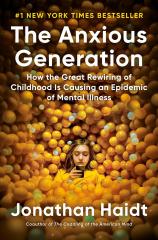Reading Group Guide
Discussion Questions
The Anxious Generation: How the Great Rewiring of Childhood Is Causing an Epidemic of Mental Illness

FOR PARENTS
TECHNOLOGY:
1. The book says that today we overprotect children and adolescents in the real world and underprotect them in the virtual world. Do you see this happening? Where?
2. What problems do smartphones, social media and screens solve in your family, and what problems do they create?
3. Do you have any tech rules in your home? Do they work? Are there some that you have heard of, or would like to try?
4. What would you like to change, if anything, about your kids’ relationship with smartphones and social media? What about video games and other screen-based activities?
5. How are your kids different online and offline?
PLAY:
6. The book says that one problem with a phone-based childhood is that it replaces the hours children would otherwise spend playing in the real world: “Children are, in a sense, deprived of childhood.” Do you agree about this for children in general or your own? What exactly are kids missing out on?
7. Think back on your own childhood. What are your most thrilling memories? Could your child have a similar experience today?
8. What did you get from “just playing” as a kid?
9. “Free play” means playing without adults organizing or even supervising. What reservations do you have about allowing your own children more unsupervised time?
10. Jon and Lenore suggest a few ways to give your kids more unstructured, unsupervised opportunities for free play, such as keeping Fridays open so neighborhood kids can get together. What small steps could you take toward adding more free play to your children’s lives?
INDEPENDENCE:
11. When you were your child(ren)’s age, what did your parents trust you to do on your own? How did that make you feel?
12. What are some things you do for your children that they could start doing for themselves?
13. What are some things you do for your family that your children could start doing for you?
14. Think about a time when you were a child and something went wrong when no adult was around. How did you solve the problem?
15. How can you give your kids more opportunities to be part of the real world rather than the virtual one?
16. Modern technology makes it very easy to track our children’s whereabouts, grades and even behavior electronically. This can become “the world’s longest umbilical cord.” Could you cut down on the ways in which you electronically track or watch your child in the real world? How?
FOR YOU:
17. What problems do smartphones, social media and screens solve in your own life, and what problems do they create?
18. Do you have any tech rules for yourself? Do they work?
19. What would you like to change, if anything, about your own relationship with smartphones and social media? What about video games and other screen-based activities?
20. How are you different online and offline?
OVERALL:
21. In what ways can we better prepare our kids to wisely navigate the virtual world?
22. In what ways can we better prepare our kids to wisely navigate the real world?
23. Would you want to grow up the way today’s kids are growing up? Why or why not? What are some benefits of growing up today? What would you want to preserve/carry forward from your own upbringing?
24. What actions can you take, on your own and with like-minded parents, to lessen your kids’ time spent in the virtual world and increase their opportunities for fun and responsibility in the physical world?
» Click here for the complete reader's guide, which includes sections focused on educators and teens.
The Anxious Generation: How the Great Rewiring of Childhood Is Causing an Epidemic of Mental Illness
- Publication Date: March 26, 2024
- Genres: Nonfiction, Parenting, Personal Growth, Psychology
- Hardcover: 400 pages
- Publisher: Penguin Press
- ISBN-10: 0593655036
- ISBN-13: 9780593655030







